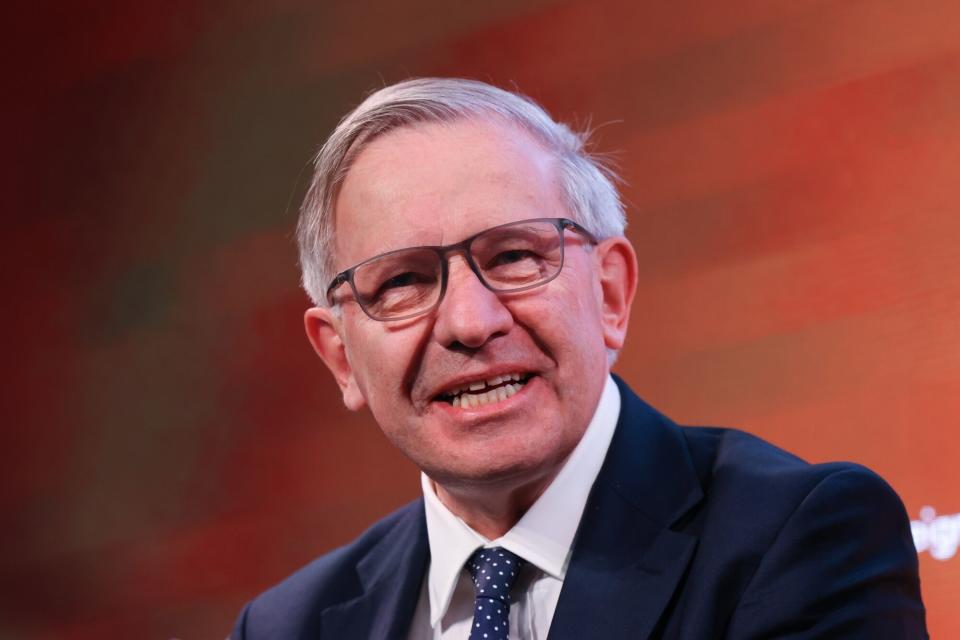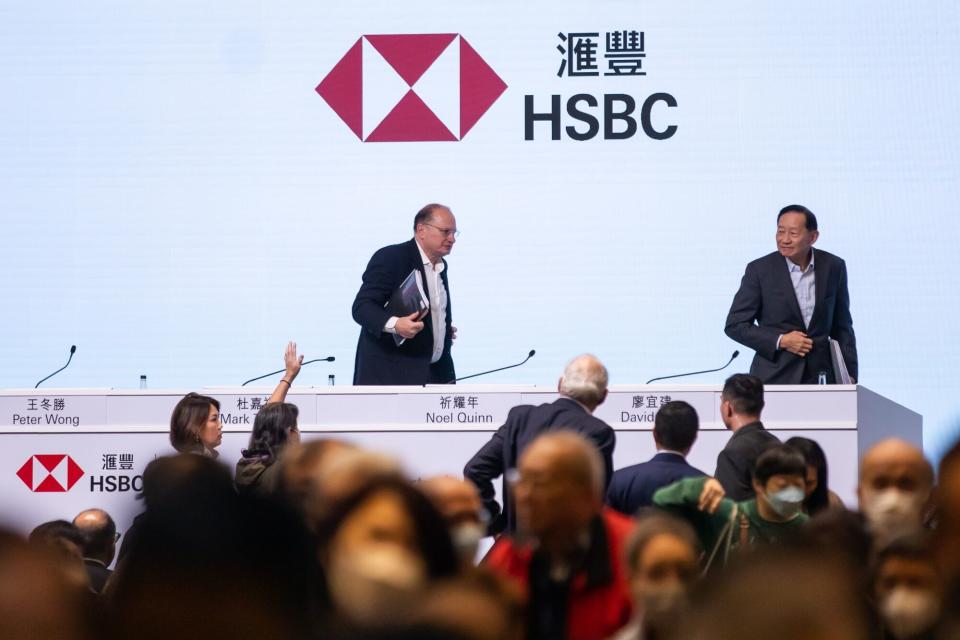HSBC’s China Game Plan Clashes With Rising Political Risks
(Bloomberg) -- HSBC Holdings Plc is distancing itself from its top diplomat at an awkward time. In some ways, the bank has never needed the role more.
Most Read from Bloomberg
Israel Latest: Israel Vows to Wipe Out Hamas as Ground War Looms
Apollo CEO Marc Rowan Demands UPenn Leaders Quit Over ‘Antisemitism’
Wall Street Brushes Off Hot PPI as Stocks Advance: Markets Wrap
House Republicans Pick Scalise as Speaker Nominee in Trump Snub
Public affairs head Sherard Cowper-Coles is expected to leave the position after his unguarded comments about the UK’s “weak” handling of relations with Beijing by siding with the US, which triggered fresh scrutiny of HSBC’s engagement with China and the West.
His phrasing was a blunt reminder that HSBC is only getting deeper into China even as its economy struggles and tensions simmer with the US. The lender agreed to buy Citigroup Inc.’s retail wealth business in the mainland this week, adding a further $3.6 billion in assets and deposits in the Communist Party-controlled nation.
Cowper-Coles, a former UK ambassador who’s spent a decade at HSBC, insists his comments in June were made in a personal capacity. Still, there’s no question the bank would have a lot to gain if the UK took his advice to warm to China, even if it stokes a backlash from Washington. HSBC itself has little flexibility in its own stance toward Beijing, given its longstanding ties and reliance on the world’s second-biggest economy. The bank declined to comment.
“The strategy of most has been to remain as aloof from the politics as possible,” said Dennis Wilder, the Central Intelligence Agency’s former deputy assistant director for East Asia and the Pacific. “With far greater scrutiny now from places like the US Congress, it becomes more and more difficult for them to remain below the radar.”
Geopolitical tensions have become one of the single largest risks for multi-nationals as conflict rages on in Ukraine, the Middle East and spats persist between the US and China over Taiwan.
‘Outsized Influence’
HSBC has long spearheaded efforts to ease tensions, funding lobbying efforts while backing the Hong Kong government’s controversial security law in 2020.
According to public filings reviewed by Bloomberg News and Hong Kong Watch, HSBC has been among the biggest sponsors of the Great Britain-China Centre’s Future Leaders Programme, a UK government-backed initiative designed to mentor the next generation of public servants. The bank was until recently the joint largest funder of the All-Party Parliamentary Group on China, an informal gathering of UK lawmakers set up to encourage business between the two countries.
HSBC was also a major backer of the Belt and Road Summit that took place last month in Hong Kong, an event to promote business involvement in Chinese President Xi Jinping’s signature economic project.
“The evidence points to HSBC having an outsized influence on UK-China policy which may not serve the UK’s economic, national security, or foreign policy interests,” said Sam Goodman, director of policy at Hong Kong Watch and a director at the China Strategic Risks Institute.
The bank’s support for Chinese relations comes with the risk of angering lawmakers in London and Washington, as the US seeks to deny China a military edge by choking its tech sector with sanctions.
China hawk and former UK Conservative Party leader, Iain Duncan Smith, called HSBC “apologists” for the Chinese government in the immediate aftermath of the remarks by Cowper-Coles. The comments showed “arrogant complacency where principles and regard for human suffering kowtow to business opportunity,” he said.
Marco Rubio, a Republican senator from Florida and vice chairman of the US Senate Intelligence Committee, told Bloomberg News that HSBC “consistently prioritizes making money in China over anything else, including human rights in Hong Kong.”
Frayed Relations
HSBC Chairman Mark Tucker has visited China this year, including a meeting in July with Chinese Communist Party’s party secretary of Beijing. It’s an obvious place for him to spend time: the bank counts Hong Kong as its biggest market, while Ping An Insurance Group Co. — its biggest and sometimes thorniest shareholder — is based in Shenzhen.
Tucker has been sympathetic to Cowper-Coles’ views on improving relations with China, according to people familiar with the matter. Cowper-Coles said at a private London event that Britain shouldn’t toe Washington’s line blindly but should look after its own interests. At a separate event, he made comments about Saudi Arabia that drew further criticism.
“For years now, Beijing and Washington have been wanting Western businesses to choose sides,” said Isaac Stone Fish, founder of Strategy Risks in New York, which specializes in corporate relationships with China. “Comments like those – even delivered in a ‘personal’ capacity – paint a target on HSBC’s back for those in Congress looking to make an example out of a Western bank for their ties to the Chinese Communist Party.”
The lender has worked hard to repair its relationship with Beijing, which became frayed in 2019 after it emerged that it cooperated in a US-led probe of Huawei Technologies Co.
The dangers for multinationals and their employees who find themselves on the wrong side of Chinese authorities are numerous, even for those who are less reliant than HSBC. Beijing has been using its “unreliable entity list” to penalize firms it thinks damage national security.
The country blocked a senior executive at US risk advisory firm Kroll from leaving the mainland, the Wall Street Journal reported in September, in the latest case of authorities imposing exit bans on employees of foreign companies. Even Apple Inc., which has invested billions in the Asian country and developed close ties to the ruling elite, is grappling with a government ban on iPhones as it gets caught up in Beijing’s spat with the US over computer chips.
“HSBC understands where its future growth lies,” said Mark Williams, who teaches finance at Boston University. “Previously, HSBC has tried to tightrope its Western and Asian interests, but the escalating political tension is pushing the bank to pick a side, picking Asia and growth over the West.”
--With assistance from Sam Nagarajan, Daniel Flatley and Denise Wee.
Most Read from Bloomberg Businessweek
The War in Israel Shows How Social Media’s Idealistic Era Has Ended
Worst US Bond Selloff Since 1787 Marks End of Free-Money Era
Business Schools Aim to Build Entrepreneurs With Expanded Programs
©2023 Bloomberg L.P.



